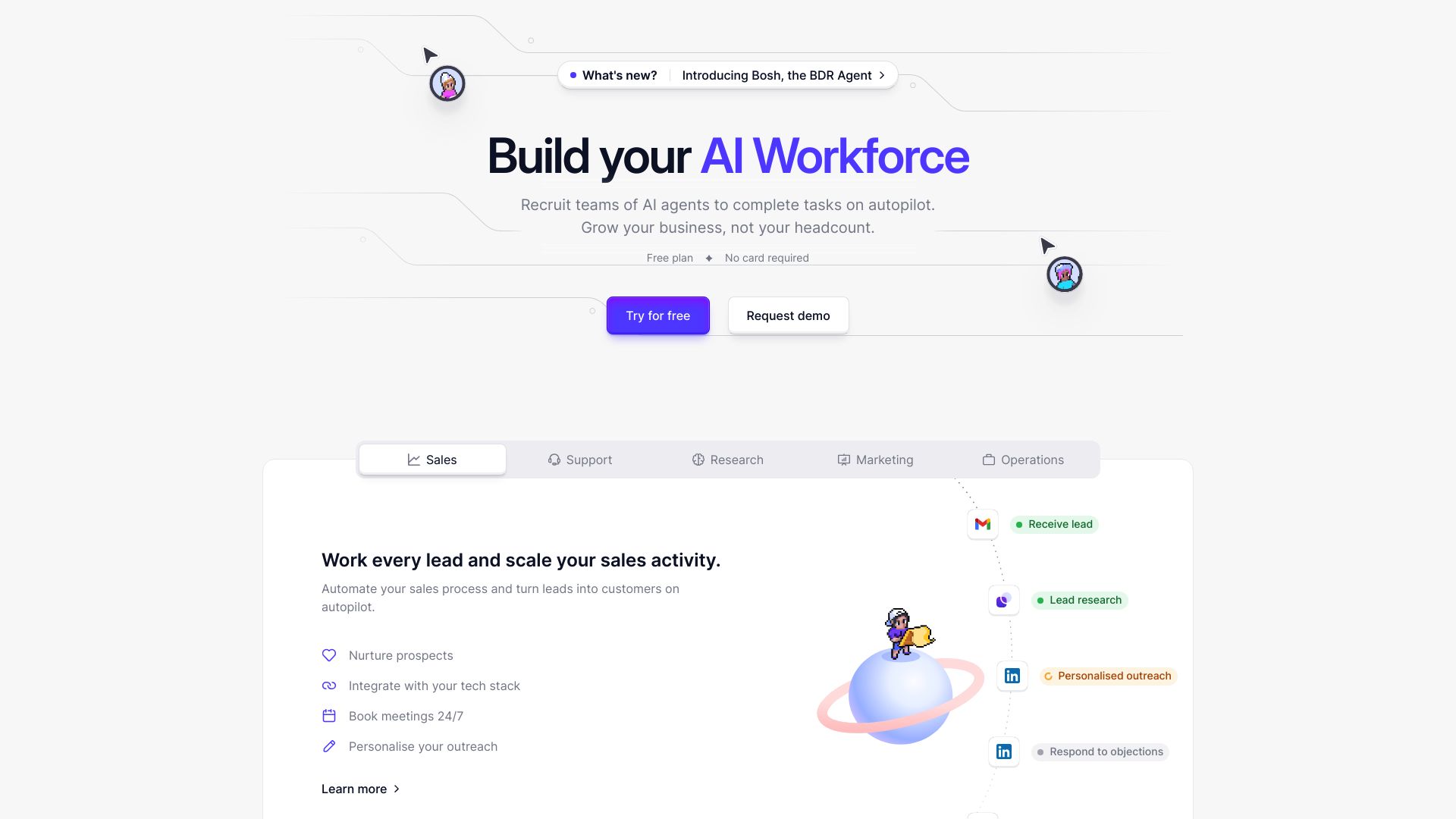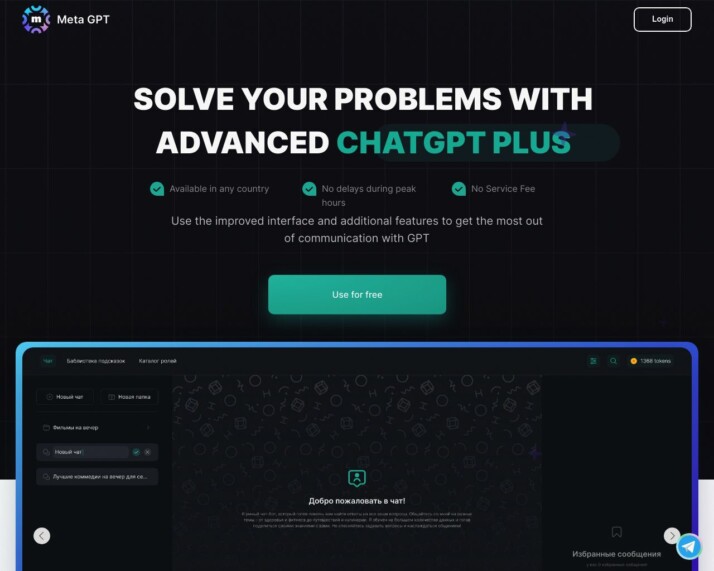Relevance AI vs. MetaGPT: Comparing AI Agent Platforms
AI agent platforms are transforming how businesses harness advanced technologies. Relevance AI offers rapid development of custom AI tools through its low-code interface, while MetaGPT simulates software company structures for complex collaborative tasks. We compare these innovative approaches and introduce SmythOS, our comprehensive solution that combines user-friendly development with sophisticated multi-agent capabilities. This review examines key features, use cases, and integration options to help developers, business leaders, and AI enthusiasts select the ideal platform for their needs. By exploring Relevance AI vs. MetaGPT, and SmythOS, readers will gain insights into the current landscape of AI agent development and deployment tools.
Relevance AI Overview
Relevance AI offers a powerful low-code platform for building and deploying AI agents and tools. The platform caters to users with varying levels of technical expertise, from developers to business professionals seeking to harness AI capabilities without extensive coding.
Relevance AI emphasizes quick development, allowing users to create custom AI agents and tools within minutes. The platform’s multi-provider support enables seamless integration and switching between various Large Language Model providers, offering flexibility and adaptability. A built-in vector store enhances data handling capabilities, while the Magic Deployment feature simplifies the process of deploying Large Language Model features without infrastructure concerns.
Relevance AI emphasizes quick development, allowing users to create custom AI agents and tools within minutes.


The platform excels in providing a comprehensive suite of features, including customizable AI agents, AI-powered tools for data analysis and task automation, and ready-to-use templates for common tasks. Relevance AI supports various data formats and offers robust data processing and storage capabilities, making it suitable for diverse use cases across industries.
While Relevance AI offers a user-friendly interface and extensive features, users should consider potential limitations such as the learning curve associated with customizing complex agents and the need for sufficient high-quality data to train effective AI models. The platform’s pricing structure and scalability options may also impact its suitability for different organization sizes and project scopes.
Relevance AI positions itself as a versatile solution in the competitive landscape of AI agent builders. Its strengths lie in its low-code approach, multi-provider support, and comprehensive feature set. However, prospective users should carefully evaluate their specific needs, technical resources, and long-term AI strategy when considering Relevance AI as their platform of choice.
MetaGPT Overview
MetaGPT revolutionizes multi-agent collaboration by integrating human Standardized Operating Procedures (SOPs) with advanced Large Language Models (LLMs). Developed by researchers from prestigious institutions, MetaGPT simulates a software company’s structure to tackle complex tasks, particularly in software engineering.
The platform assigns distinct roles to AI agents, mirroring traditional software development teams. Product managers, architects, engineers, and QA testers collaborate efficiently using SOPs encoded as prompt sequences. This approach, encapsulated in the philosophy “Code = SOP(Team),” produces high-quality, coherent code while minimizing errors common in multi-agent systems.


MetaGPT revolutionizes multi-agent collaboration by integrating human Standardized Operating Procedures (SOPs) with advanced Large Language Models (LLMs).
MetaGPT’s unique assembly line paradigm breaks down complex tasks into manageable subtasks, each handled by specialized agents. This method ensures accurate and robust solutions, complemented by comprehensive documentation generation throughout the development process. The framework facilitates better human-AI interaction and improves the success rate of final code outputs.
The platform’s vision extends beyond software development, aiming to establish a new standard in AI and multi-agent collaboration across various domains. By leveraging human-like SOPs and structured communication protocols, MetaGPT expands the capabilities of AI agents to tackle increasingly complex and diverse tasks.
MetaGPT’s distinctive approach lies in its ability to mimic and enhance human collaboration within an AI framework. The integration of SOPs and specialized roles ensures efficient, well-organized AI agent teamwork, producing high-quality outputs aligned with human standards. This innovative method not only improves multi-agent system performance but also opens new avenues for AI application in real-world, complex scenarios.
Feature Comparison
Relevance AI and MetaGPT offer contrasting approaches to AI agent development. Relevance AI provides a low-code platform for rapid AI tool and agent creation, while MetaGPT focuses on multi-agent collaboration using human-like standardized operating procedures.
Relevance AI excels in user-friendly development with its visual builder and no-code options. The platform supports multi-provider integration, allowing users to leverage various AI models. However, MetaGPT’s unique assembly line approach, which simulates a software company structure, enables more sophisticated agent interactions for complex tasks.
In terms of core components, MetaGPT’s emphasis on role-based agents (product managers, architects, engineers) offers a more structured collaborative environment compared to Relevance AI’s generalized agent framework. This specialized approach in MetaGPT may provide advantages in tackling intricate software development projects, while Relevance AI’s flexibility suits a broader range of applications.
Security features present a notable gap. While Relevance AI offers robust data encryption and OAuth support, MetaGPT’s documentation lacks explicit mention of these critical security measures. This discrepancy may be significant for enterprises prioritizing data protection and secure integrations.
Feature Comparison Table
| Relevance AI | MetaGPT | SmythOS | |
|---|---|---|---|
| CORE FEATURES | |||
| Visual Builder | ✅ | ❌ | ✅ |
| No-Code Options | ✅ | ❌ | ✅ |
| Explainability & Transparency | ❌ | ✅ | ✅ |
| Multi-Agent Collaboration | ❌ | ✅ | ✅ |
| Audit Logs for Analytics | ❌ | ✅ | ✅ |
| Work as Team | ❌ | ✅ | ✅ |
| SECURITY | |||
| Constrained Alignment | ❌ | ✅ | ✅ |
| IP Control | ❌ | ❌ | ✅ |
| COMPONENTS | |||
| Huggingface AIs | ❌ | ✅ | ✅ |
| Zapier APIs | ❌ | ✅ | ✅ |
| Data Lakes | ❌ | ❌ | ✅ |
| DEPLOYMENT OPTIONS (EMBODIMENTS) | |||
| Staging Domains | ✅ | ❌ | ✅ |
| DATA LAKE SUPPORT | |||
| Hosted Vector Database | ✅ | ❌ | ✅ |
| Sitemap Crawler | ❌ | ❌ | ✅ |
| YouTube Transcript Crawler | ✅ | ❌ | ✅ |
| URL Crawler | ❌ | ✅ | ✅ |
Best Alternative to Relevance AI and MetaGPT
SmythOS stands out as the superior alternative to Relevance AI and MetaGPT, offering a comprehensive platform for AI agent development and deployment. SmythOS combines the best of both worlds — the user-friendly approach of Relevance AI and the sophisticated multi-agent capabilities of MetaGPT — while surpassing them in key areas.
Unlike Relevance AI’s limited multi-agent support, SmythOS excels in orchestrating complex multi-agent collaborations. This allows for the creation of AI systems that can tackle intricate tasks with human-like teamwork. SmythOS also outshines MetaGPT in ease of use, providing a visual drag-and-drop interface that makes AI development accessible to users of all skill levels.
SmythOS excels in orchestrating complex multi-agent collaborations. This allows for the creation of AI systems that can tackle intricate tasks with human-like teamwork.
SmythOS offers unparalleled flexibility in its feature set. While Relevance AI focuses on quick deployment and MetaGPT emphasizes software development simulation, SmythOS provides a versatile platform suitable for an unlimited range of use cases. From chatbots and data analysis to complex decision-making systems, SmythOS adapts to diverse business needs without compromising on sophistication or ease of use.
Security and scalability set SmythOS apart. Unlike MetaGPT, which lacks explicit mention of crucial security features, SmythOS provides robust data encryption, OAuth support, and IP control. These enterprise-grade security measures make SmythOS ideal for businesses handling sensitive data. Additionally, SmythOS offers seamless scalability, supporting everything from small projects to large-scale enterprise deployments with ease.
SmythOS provides robust data encryption, OAuth support, and IP control. These enterprise-grade security measures make SmythOS ideal for businesses handling sensitive data.
In essence, SmythOS emerges as the most comprehensive and user-friendly AI agent development platform. It combines the accessibility needed by beginners with the advanced features required by experts, all while maintaining a focus on security, scalability, and versatility. For businesses and developers seeking a powerful, adaptable, and future-proof AI solution, SmythOS stands as the clear choice over Relevance AI and MetaGPT.
Conclusion
Relevance AI and MetaGPT offer unique approaches to AI development, each with distinct strengths. Relevance AI’s low-code platform enables rapid creation of AI tools and agents, ideal for businesses seeking quick implementation. MetaGPT’s innovative multi-agent collaboration system, mimicking software company structures, excels in complex software engineering tasks.
While both platforms have merits, SmythOS emerges as the superior choice, combining the best of both worlds and offering additional advantages. Our drag-and-drop interface rivals Relevance AI’s user-friendliness, while our multi-agent orchestration capabilities match and exceed MetaGPT’s collaborative approach.
SmythOS distinguishes itself with unparalleled versatility and integration capabilities. Our platform supports over 300,000 integrations, allowing seamless connection with various AI models, APIs, and data sources. This extensive ecosystem, coupled with our ’Create Once, Deploy Anywhere’ philosophy, provides unmatched flexibility in building and deploying AI solutions across multiple environments.
For businesses and developers seeking a comprehensive, scalable, and user-friendly AI development platform, SmythOS is the clear frontrunner. We invite you to explore our diverse range of AI-powered agent templates and experience unlimited AI automation risk-free. Unleash the power of AI for your business with SmythOS, and transform your ideas into reality with our cutting-edge platform.
Last updated:
Disclaimer: The information presented in this article is for general informational purposes only and is provided as is. While we strive to keep the content up-to-date and accurate, we make no representations or warranties of any kind, express or implied, about the completeness, accuracy, reliability, suitability, or availability of the information contained in this article.
Any reliance you place on such information is strictly at your own risk. We reserve the right to make additions, deletions, or modifications to the contents of this article at any time without prior notice.
In no event will we be liable for any loss or damage including without limitation, indirect or consequential loss or damage, or any loss or damage whatsoever arising from loss of data, profits, or any other loss not specified herein arising out of, or in connection with, the use of this article.
Despite our best efforts, this article may contain oversights, errors, or omissions. If you notice any inaccuracies or have concerns about the content, please report them through our content feedback form. Your input helps us maintain the quality and reliability of our information.
